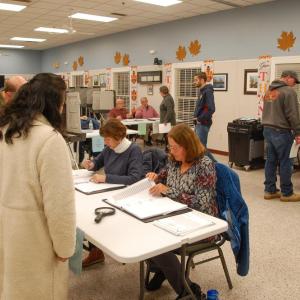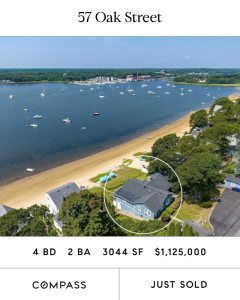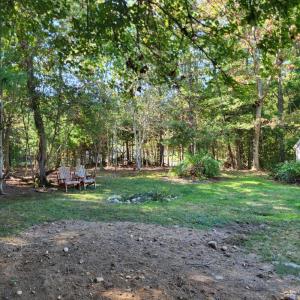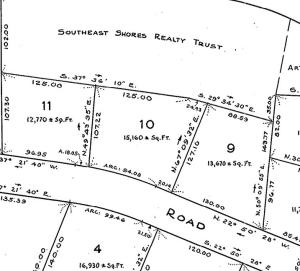$288 million Old Colony project denied by voters
 Stickers were avaliable after voters cast their ballots. Photos by Mari Huglin
Stickers were avaliable after voters cast their ballots. Photos by Mari Huglin Rochester residents voted at the Rochester Council on Aging.
Rochester residents voted at the Rochester Council on Aging.  Volunteers assisted voters from 12 p.m. to 8 p.m.
Volunteers assisted voters from 12 p.m. to 8 p.m. Jason and Lindsay Donati cast their ballots.
Jason and Lindsay Donati cast their ballots.  A few signs supporting Old Colony were spread throughout the Tri-town.
A few signs supporting Old Colony were spread throughout the Tri-town.  Stickers were avaliable after voters cast their ballots. Photos by Mari Huglin
Stickers were avaliable after voters cast their ballots. Photos by Mari Huglin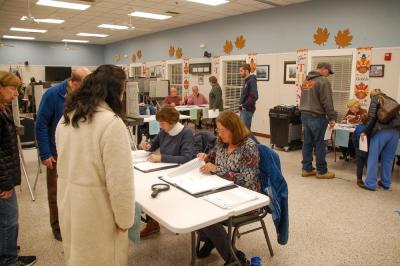 Rochester residents voted at the Rochester Council on Aging.
Rochester residents voted at the Rochester Council on Aging.  Volunteers assisted voters from 12 p.m. to 8 p.m.
Volunteers assisted voters from 12 p.m. to 8 p.m.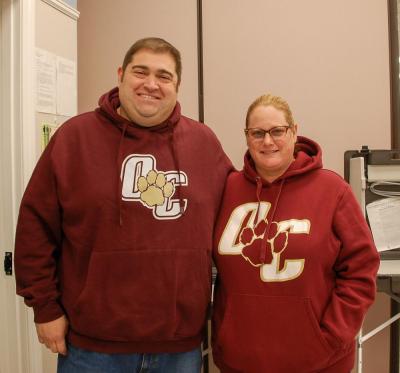 Jason and Lindsay Donati cast their ballots.
Jason and Lindsay Donati cast their ballots.  A few signs supporting Old Colony were spread throughout the Tri-town.
A few signs supporting Old Colony were spread throughout the Tri-town. The five member towns of the Old Colony Regional Vocational Technical School district did not approve a proposed $288 million building project at the polls on Tuesday, Nov. 18.
A simple majority across votes from Rochester, Mattapoisett, Carver, Acushnet and Lakeville — the five towns who send students to Old Colony — was needed to approve the project.
Across the five towns, 5,035 residents voted — with 1923 voting in support and 3112 voting against the proposal.
“It’s a sad moment for Old Colony, after years of work and planning…Our students deserve better. These projects don’t become less expensive with time,” said Old Colony Superintendent Polansky.
Old Colony proposed a $288 million project to construct a new school building that would increase the student population and address aging infrastructure.
Rochester was estimated to pay $28 million while Mattapoisett was estimated to pay $8.5 million if the project received voter approval.
In Rochester, voters did not approve the project, which nulled the second ballot question of whether to fund the project with a temporary increase in taxes.
Mattapoisett was the only town with a majority Yes vote, with finalized totals adding up to 278 Yes votes and 202 No votes.
Mattapoisett resident Yasmin Flefleh-Vincent said she voted Yes on the building proposal. She is a vocational instructor at Greater New Bedford Regional Vocational Technical High School whose son graduated from Old Colony.
“I feel strongly that our system works. When we have an educational initiative, something like this, I find it to be supportive of the community,” she said.
Despite the majority win in Mattapoisett, almost half of the voters were still critical about the proposal and voted no.
“I think we do need vocational schools. I think we need more, but I don’t think this is the way to go,” said an anonymous voter in Mattapoisett.
In Rochester, 689 voters denied the project while 503 approved it.
Jason Donati of Rochester hoped the project would pass, but was just happy to have the opportunity to vote and support Old Colony.
“I'm hoping that this will give generations to come an opportunity to follow their passion in trades and be able to help build back and give back to the community,” said Donati.
Donati and other in-favor voters explained that giving students an opportunity to choose a vocational school is important.
“Our son is currently a senior at Old Colony and it's changed his life and for the better and seen the change that a lot of the kids that go there and see how much they flourish,” said Donati.
Many Rochester residents were concerned about the cost of the project, not wanting to pay more taxes, especially with a Proposition 2½ debt exclusion.
“We appreciate the opportunity for there to be vocational schools. However, what I disagreed with was some of the cost, particularly the heating system difference being $7 million,” said an anonymous Rochester resident.
Some residents thought the building was too extravagant for what is truly needed.
“I don't think you need to be in a state-of-the-art facility to get a state-of-the-art education,” said the anonymous resident.
Old Colony officials point out that there are alternatives to the rebuild if the proposal does not pass. The school district can come back to the voters another time with a new proposal — but they would have to wait until the competitive state grants become available again in the future.
The cost to repair the current building is significant. The district estimates it would cost about $134 million to make the necessary repairs and renovations if a new school was not built. In addition, that cost is estimated without any state-grant funding to soften the price to member towns — whereas the new construction would see a state reimbursement of $129 million.
Repairs will not increase the student population, but bring the needed improvement to safety, accessibility and energy efficiency standards.
“If we don't [build a new high school] right now, it would be fiscally irresponsible to put a band-aid on a 50-year-old building,” said Aaron Polansky, Old Colony’s superintendent.
The school district can come back to the voters another time with a new building proposal — but they would have to wait until the competitive state grants become available again in the future.
“We will continue to put our best foot forward and will begin exploring the necessary repair process for a number of items that can no longer wait…We will learn from this and grow,” said Polansky.



















